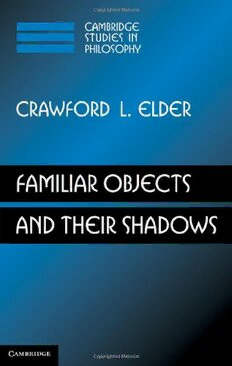
Familiar Objects and their Shadows PDF
223 Pages·2011·1.825 MB·English
Most books are stored in the elastic cloud where traffic is expensive. For this reason, we have a limit on daily download.
Preview Familiar Objects and their Shadows
Description:
Most contemporary metaphysicians are sceptical about the reality of familiar objects such as dogs and trees, people and desks, cells and stars. They prefer an ontology of the spatially tiny or temporally tiny. Tiny microparticles 'dog-wise arranged' explain the appearance, they say, that there are dogs; microparticles obeying microphysics collectively cause anything that a baseball appears to cause; temporal stages collectively sustain the illusion of enduring objects that persist across changes. Crawford L. Elder argues that all such attempts to 'explain away' familiar objects project downwards, onto the tiny entities, structures and features of familiar objects themselves. He contends that sceptical metaphysicians are thus employing shadows of familiar objects, while denying that the entities which cast those shadows really exist. He argues that the shadows are indeed really there, because their sources - familiar objects - are mind-independently real.
See more
The list of books you might like
Most books are stored in the elastic cloud where traffic is expensive. For this reason, we have a limit on daily download.
